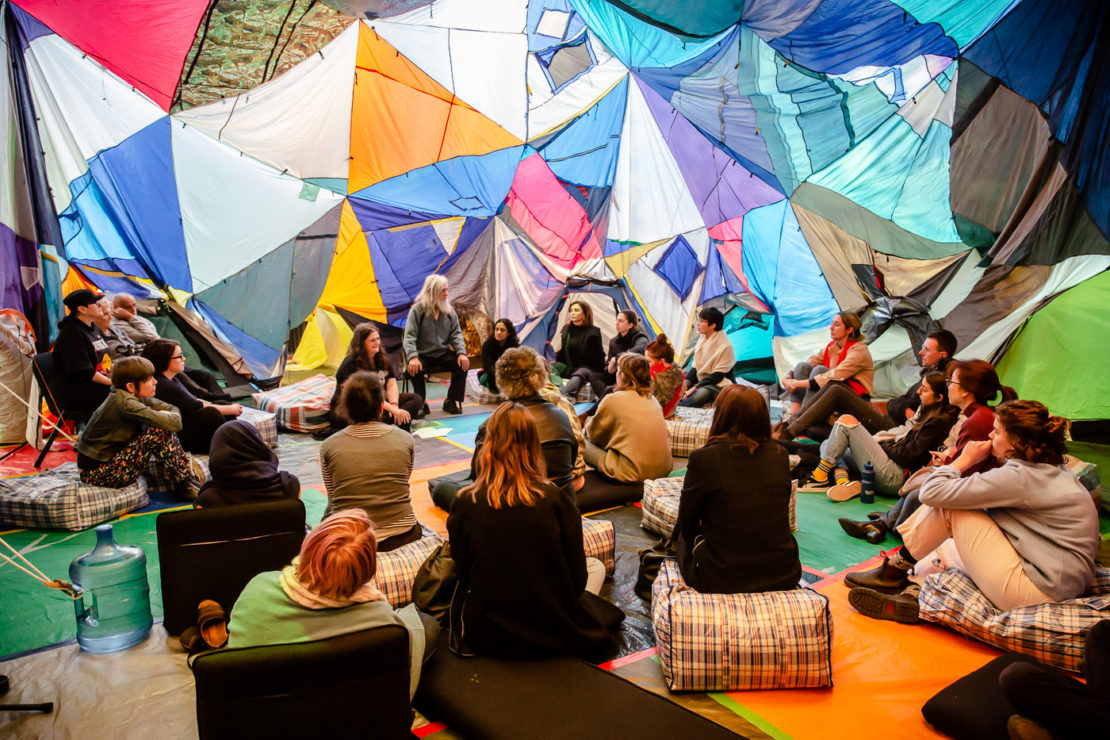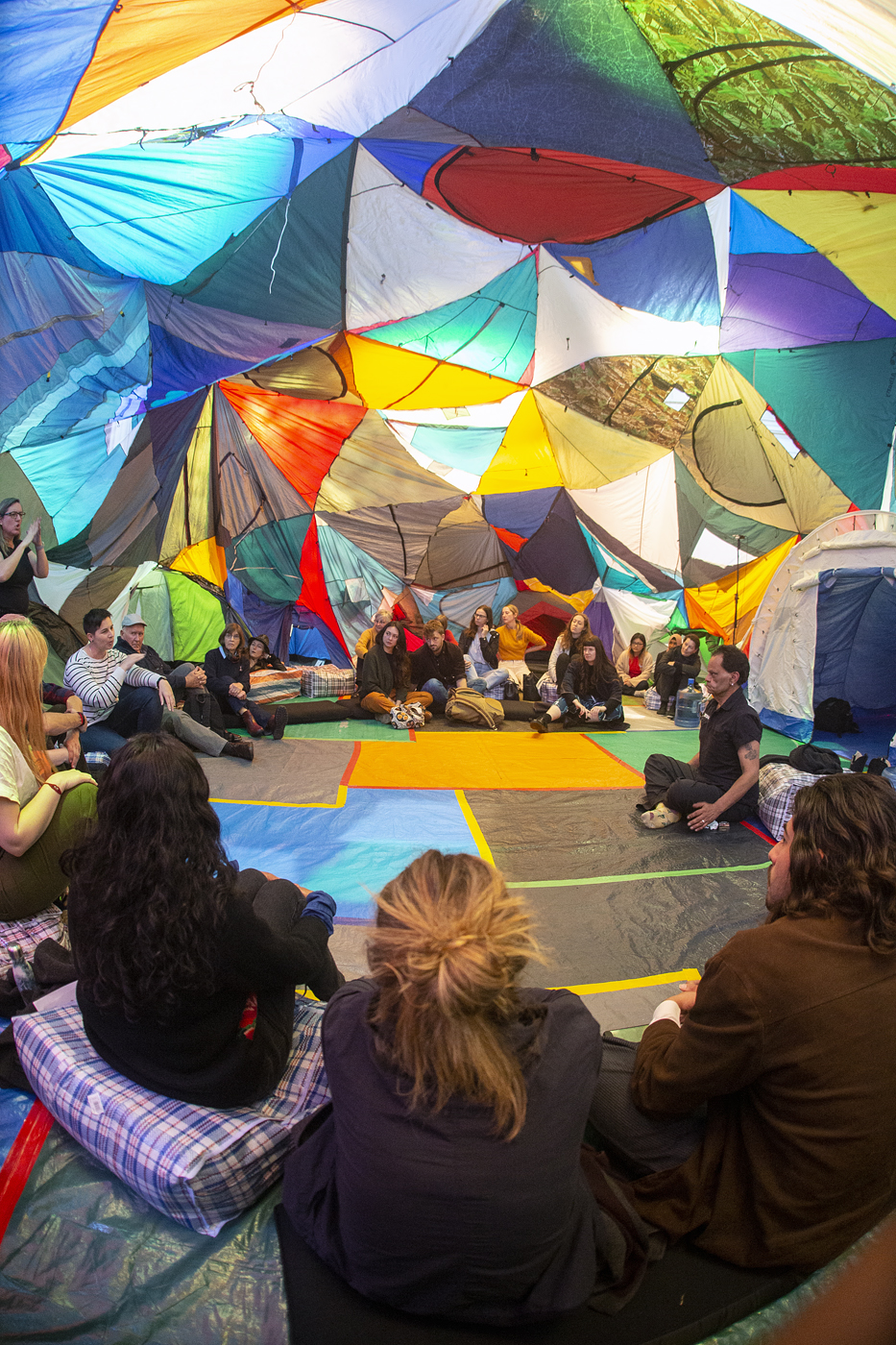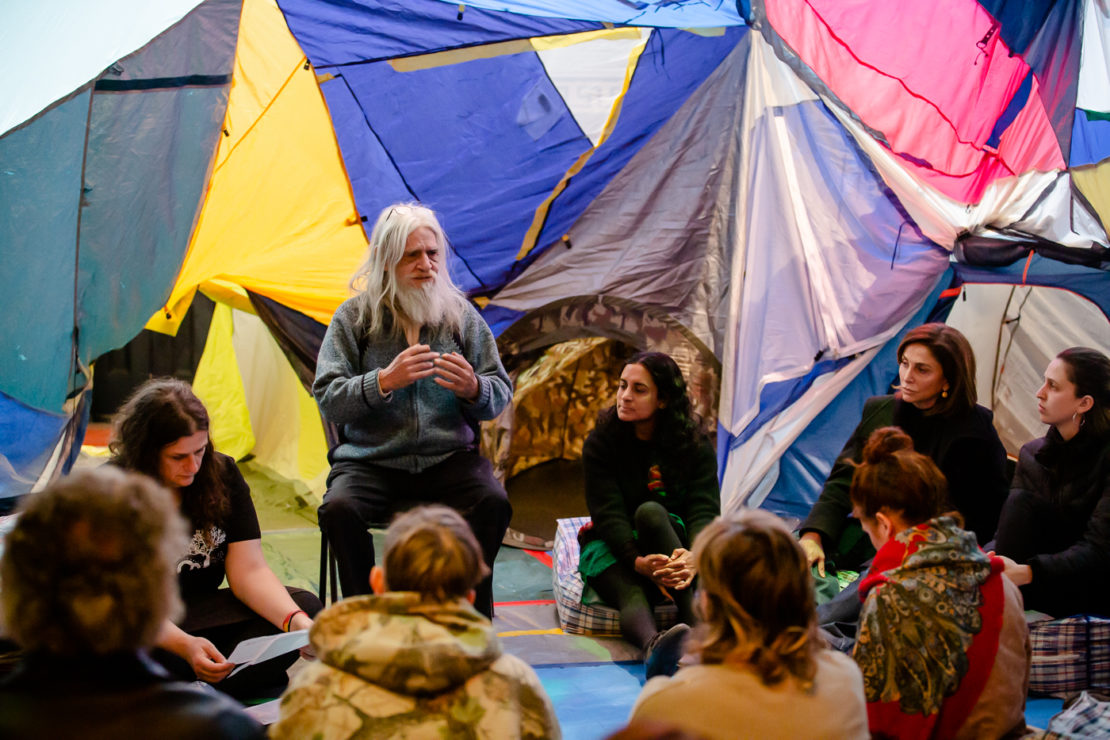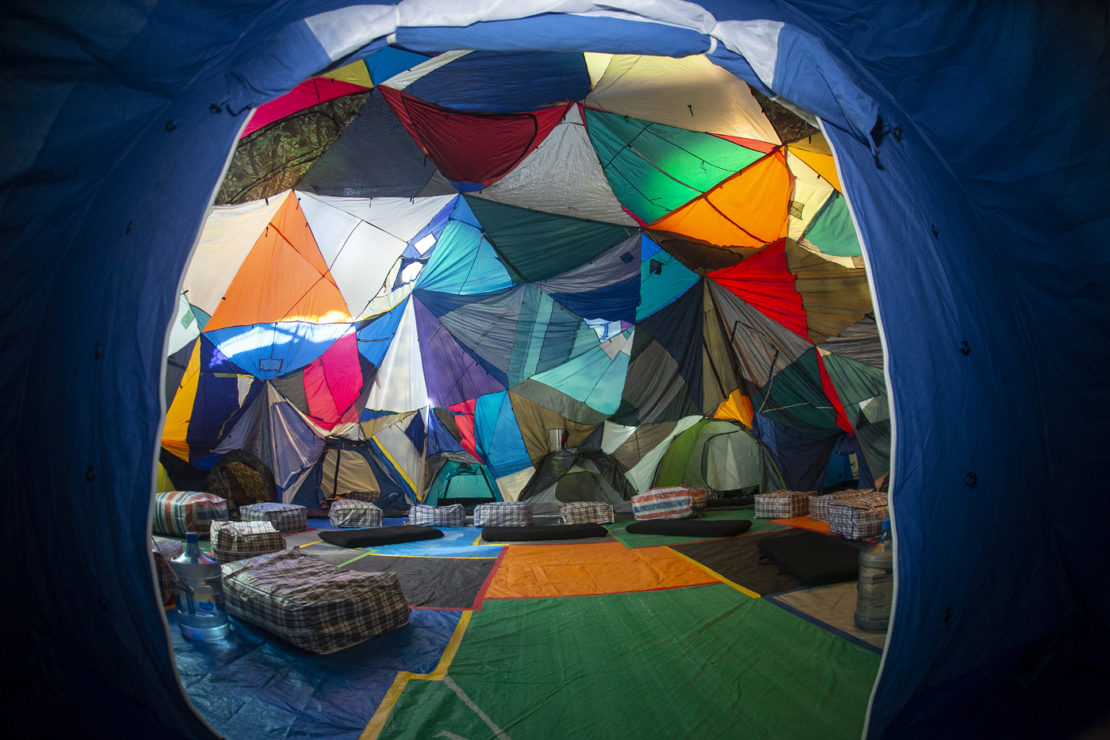North Melbourne School of Displacement (2019) acknowledges the Traditional Owners and Custodians of the land on which our learning takes place, the Wurundjeri and Boon Wurrung peoples of the Kulin Nation, and pays respect to Elders, past, present and future. We honour the ancient First Nations knowledge systems that have and continue to shape the land and waterways sustainably.
Opening a dialogue from here, North Melbourne School of Displacement puts learning itself under the microscope with a series of discussions that offer vital correctives to the methods of sharing knowledge that dominate our society.
Housed in a temporary architecture constructed from masses of salvaged tents, the school emphasises that learning should not be confined to institutions and instead become more inclusive, accessible and connected to the community.
How does climate crisis impact gentrification and homelessness in cities? What happens when learning your ABCs means renouncing your own language? How would embracing Indigenous culture and ways of thinking help Australia survive the impacts of a climate catastrophe? With subjects focusing on dispossession and displacement, this alternative school promotes learning as a key tool in the fight for social justice.
10.30am Over our heads: Housing and homelessness
As we face increases in extreme weather and limited crisis accommodation, more people are being trapped on the streets rather than the comfort of a home. How does climate crisis impact the gentrification of cities like Melbourne? A changed, more extreme climate seems navigable only by the wealthy, but this session explores tactics citizens might use to counter their displacement from their own communities.
Featuring
Jason Russell, Peer Education and Support Program, Council to Homeless Persons
Alana Pedler, People at Risk Project Officer, Emergency Services Red Cross
1.30pm Lost for words: Displacement through enforced and prioritised language
Without our language, our knowledge and cultural identity becomes fragmented.
Control over language is intrinsically tied to colonial oppression and has been exercised through schooling. English has been used as a colonial tactic to erase and displace Indigenous languages across Australia, and beyond. How then do we shake off remnants of colonial control, and how do we embrace multiple languages and recover learnings? Is it possible to decolonise the English language?
Featuring
Parbin-ata Carolyn Briggs AM, (Boon Wurrung Senior Elder)
Harley Dunolly-Lee, Community Linguist and Project Officer (Dja Dja Wurrung), Victorian Aboriginal Corporation for Languages (VCAL)
Sione Napi Francis, Lead Curator, Te Pasifika Gallery Redevelopment, First Peoples Department, Melbourne Museum
Dr James Oliver, Transdisciplinary academic and writer, Monash University
Sun 1 Sep
10.30am In a strange land: How does culture survive when you can’t go home
How can people whose lands are disappearing due to mining, war and climate change maintain a lifeline to their cultures?
Indigenous Australian’s have survived, evolved and resisted over 200 years of displacement. In this strange land, First Nations people offer guidance to newly arrived communities who are navigating the challenge of preserving and practising culture in an unfamiliar landscape. Through this shared history, communities from around the world come together, offering stories of survival and resilience.
Featuring
Omid Tofighian, American University in Cairo/UNSW
Uncle Larry Walsh, Taungurung elder / Storyteller
Aseel Tayah, Palestinian Performer/ Vocalist/ Installation Artist and Activist
1.30pm A billycan, a crowbar and an axe: Indigenous survival techniques for the apocalypse
Indigenous Elders can survive extreme weather with minimal material resources available. There are countless examples, including five Pitjantjatjara women who endured five days in the desert using the stories of the land to guide them to water. Can the cultural knowledge, skills and resources used by Indigenous communities lead the way and help everybody else to survive the coming apocalyptic crisis?
Featuring
Uncle Dave Wandin, Wurundjeri Woi wurrung Elder / Corporation’s Manager of Cultural Practices (Fire & Water)
Claire G. Coleman, Wirlomin Noongar Writer
Muhubo Suleiman, Somali Master Weaver
Mon 2 Sep
6pm The future is Indigenous: Cultural change to survive a climate change world
Indigenous people are the world’s great survivors. In the face of land theft, climate change and genuine attempts to bring about extinction, Indigenous populations across the globe persevere. The resilience and adaptability of these populations are increasingly providing vital lessons in survival for all – how would embracing Indigenous culture and ways of thinking help Australia survive the impacts of climate catastrophe?
Featuring
Uncle Larry Walsh, Taungurung elder / Storyteller
Allara Briggs Pattison, Yorta Yorta musician, composer and climate justice activist
Claire G. Coleman, Wirlomin Noongar Writer
Rosie Kalina, Wemba Wemba and Gunditjmara Visual Artist
Tue 3 Sep
6pm Not a drop to drink: Aqua nullius and global warming, securing First Nations water rights
Who owns water when it stops flowing? Who owns land when it’s underwater?
Drought and flooding are twinned threats in the global climate crisis, as rivers dry up or are dammed and sea-levels inexorably rise. How do the communities that rely on these waterways respond? How must our understanding of water rights shift in a climate-changed world?




